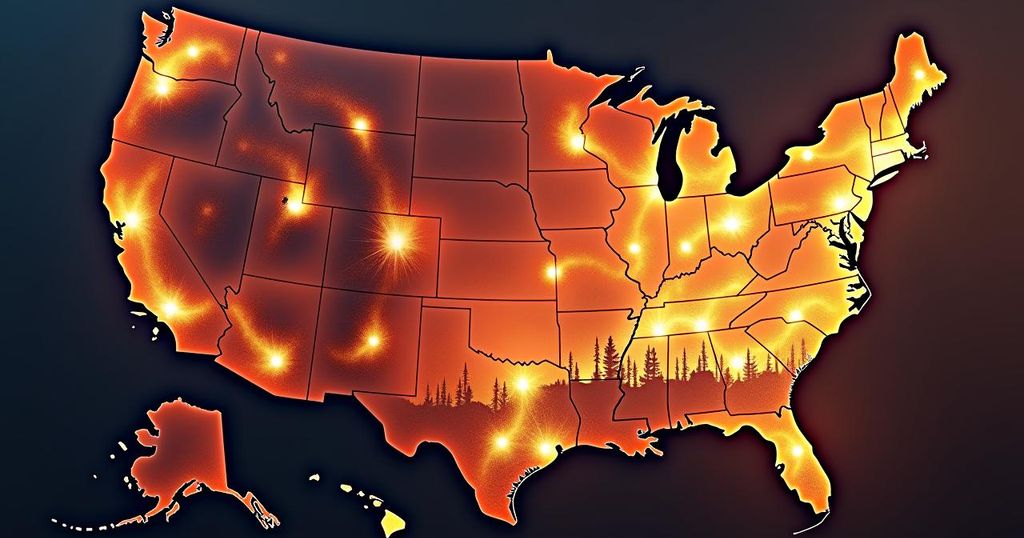Scientists assert that climate change profoundly affects the increasing frequency and severity of disasters such as hurricanes and wildfires across America. With Hurricane Helene serving as a case study, experts warn of escalating economic costs and the urgent need for communities to adapt infrastructures and preparedness strategies to combat these new realities.
Recent warnings from meteorological experts reflect a growing consensus that severe weather phenomena, such as storms and wildfires, are becoming pervasive across the United States due to climate change. Hurricane Helene has exemplified this trend, making landfall in Florida and causing significant destruction, with over 180 fatalities reported. Areas historically spared from hurricanes, such as Florida’s Big Bend, have now faced multiple storms within a single year, while regions in North Carolina, once considered resilient against climate impacts, are grappling with unprecedented flooding spurred by changing weather patterns. As noted by scientists, the frequency and intensity of natural disasters in the U.S. have escalated, resulting in increased economic costs. This surge is largely attributed to climate change, which fuels more aggressive weather systems through higher atmospheric moisture and energy levels. Current data indicates that North Carolina has shifted from experiencing one or two significant weather-related billion-dollar disasters annually from 1980 to 2009 to managing six or seven in recent years. The population boom, alongside diminished infrastructural resilience, exacerbates the vulnerabilities of both states and individuals in facing these disasters. “Pretty much 50% of the population lives within miles of the sea, more exposed to hurricanes and with an aging infrastructure that is not set for today’s climate,” remarks Mari Tye, a scientist at the National Center for Atmospheric Research. The case of Texas starkly illustrates these challenges; it has recorded an alarming number of disasters costing over $1 billion, highlighting its position as a hotspot for extreme weather events. Climate scientists express that rising global temperatures lead to stronger hurricanes and enhance the dry conditions susceptible to wildfires. Deborah Brosnan, a climate scientist, affirms, “Major hurricanes are now more likely because of the extra fuel they can extract from warmer oceans.” The cascading consequences of these climate patterns demand renewed focus on infrastructure adaptability and disaster preparedness. Hurricane Helene epitomizes the critical juncture at which society finds itself, urging reevaluation of readiness for intensifying weather events. Climatologists caution against complacency, insisting that communities must prepare for an increase in disruptive weather occurrences, which will likely be more aggressive and frequent due to climate dynamics.
The discussion surrounding climate change and its impact on natural disasters has garnered significant attention as scientists observe a notable uptick in the frequency and severity of weather events across the United States. The interplay between rising global temperatures and extreme weather phenomena is chiefly characterized by enhanced atmospheric conditions that facilitate destructive storms, floods, droughts, and wildfires. This situation is particularly concerning given the changing demographics and infrastructural vulnerabilities of areas previously deemed safe from such disasters. As populations grow and properties become increasingly valuable, the economic costs associated with these calamities are also ballooning, underscoring a stark reminder of the urgent need for comprehensive climate adaptation strategies.
In conclusion, the implications of climate change on weather patterns in the United States are profound, with events like Hurricane Helene highlighting the urgent need for communities to adapt to a new normal characterized by heightened disaster frequencies and intensities. The economic, infrastructural, and social challenges posed by these disasters necessitate an concerted effort to bolster resilience against future impacts. Policymakers and communities must engage proactively in addressing vulnerabilities, ensuring preparedness for what may be an increasingly uncertain and hazardous climate ahead.
Original Source: phys.org







